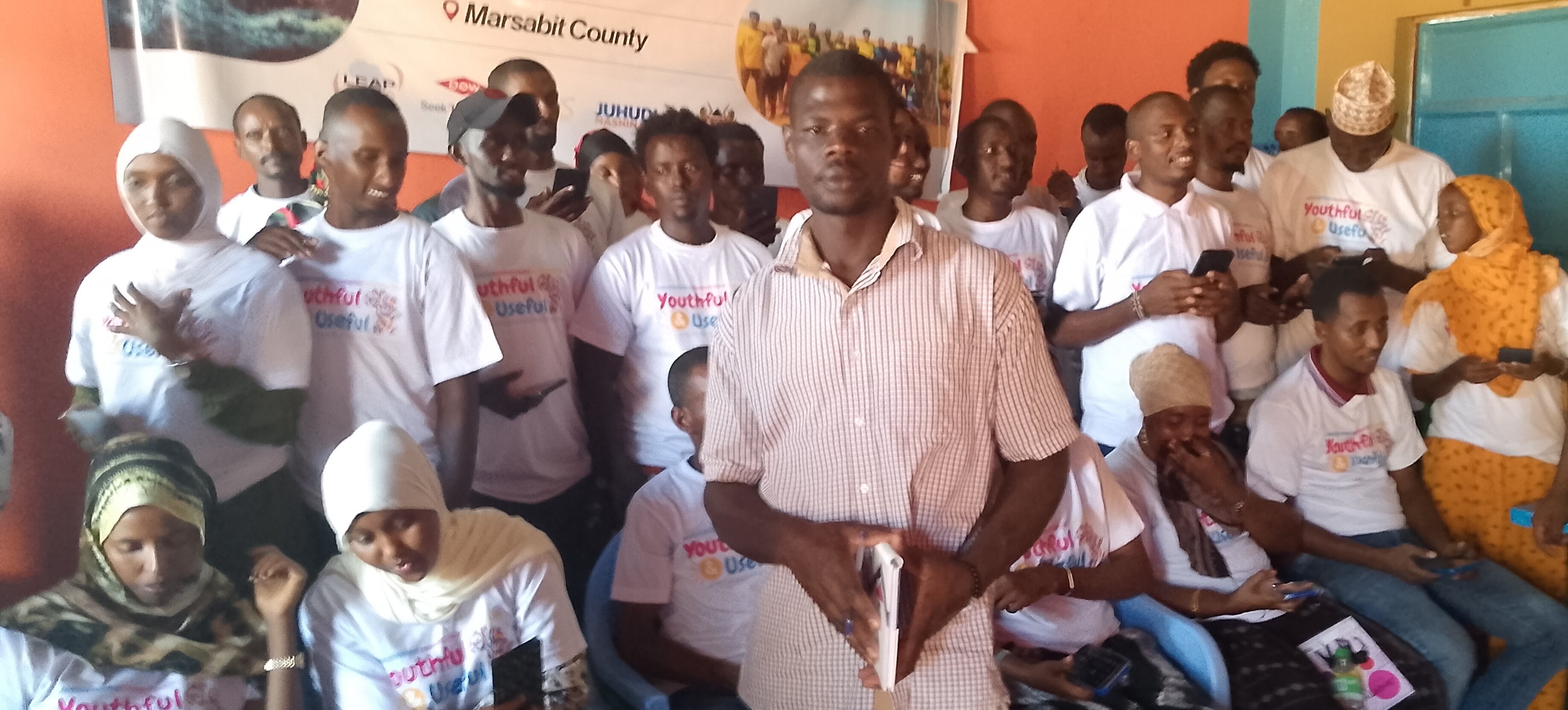Indigenous communities in Marsabit embrace digital literacy for development

Youths participating in a digital literacy training session organised by Juhudi Mashinani in collaboration with Leap Africaal at Turbi town in Marsabit County recently. They hailed ICT as a vital tool for advancing development within indigenous communities. Photo/James Murimi
Indigenous communities in Marsabit County have begun embracing the 2030 Agenda for Sustainable Development (SDG), which emphasizes the role of information and communication technologies (ICT) in accelerating human progress.
Speaking at a digital literacy training session organised by Juhudi Mashinani in collaboration with Leap Africa, youth participants in Turbi town recently hailed ICT as a vital tool for advancing development within indigenous communities.
They called on the government and non-governmental organizations to prioritize the self-sustainability and socioeconomic growth of these communities, especially in light of the growing impacts of climate change.
Ms Gumutu Katello, who is a teacher at Turbi Primary School and Junior Secondary, highlighted the lack of access to economic resources, education, and digital literacy in the region, which has hindered the community’s growth, innovation, and expression.
“The digital literacy programme we attended was eye-opening. As pastoralist communities, we now realize that we should no longer be excluded from technology,” Ms Katello said.
“With digital inclusion, we can better participate in society’s development.”
Ms Katello urged young college graduates from the region to embrace digital literacy to secure online jobs and compete on equal footing with global counterparts, helping to address the high levels of unemployment in the area.
She also suggested introducing digital literacy programmes in primary schools to help children develop technological skills from a young age.
Mr Barako Mamo, a local high school teacher, echoed Ms Katello’s sentiments, emphasizing the need for early digital literacy programmes for high school students.
He noted that including youth from indigenous communities, particularly pastoralists, in the digital revolution is crucial for their future.
The inclusion of indigenous communities in digitalisation, Mr Mamo said, would also aid in the preservation and sharing of their cultural heritage for future generations.
Mr Roba Bonaya, chairperson of the Turbi Ward Climate Change Committee, urged pastoralist communities to adopt digital literacy as a means to cope with climate change, which has reached critical levels in the region.
Following the severe drought of 2022, many pastoralists lost livestock and are now struggling with poverty.
Mr Bonaya called on youth to explore livelihood diversification opportunities through technology.
Mr Martin Kathurima, an Ajira Digital trainer, emphasized the transformative potential of technology, particularly artificial intelligence (AI), for pastoralist communities.
He noted that digital literacy could enhance education, preserve culture and traditions, improve healthcare, and expand business opportunities.
Mr Kathurima also called on Kenyan IT experts to focus on AI projects led by indigenous communities to support their socioeconomic growth.
He stressed the importance of including indigenous communities in policy-making, media, and digital regulations to protect their data sovereignty and ensure their stories are told accurately.
“There’s a pressing need for digital literacy programmes that respect indigenous learning styles and cultural practices,” said Mr Kathurima.
“Partnerships between technology companies, educational agencies, and the indigenous communities are essential to creating sustainable digital inclusion projects in the region," he added.
While acknowledging the Kenyan government’s recognition of digital inclusion as a national priority, Mr Kathurima expressed concern over the fragmented approach to implementation.
He called for a holistic strategy to ensure the affordability of digital programmes for all communities, especially in remote areas like North Horr constituency.
“The government must invest in mobile and internet connectivity and ensure a constant power supply to enable digital access in even the most remote communities,” Mr Kathurima said.
“A significant portion of households in indigenous communities still lack access to reliable, high-speed internet.”
Mr Kathurima concluded by calling for the creation of an inclusive digital future, where all communities, including indigenous ones, can benefit from the power of technology.
“Digital infrastructure and technologies are key to societal transformation and skill development if prioritized by society,” he noted.
Juhudi Mashinani Programme Officer Samwel Maina shared that during the two-day training, over 110 youths from North Horr constituency were equipped with skills to secure online employment and start their own businesses.
